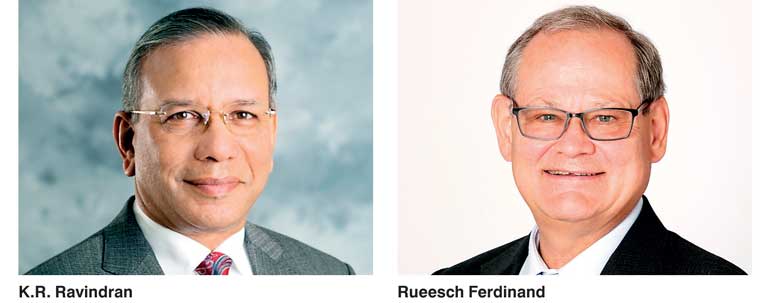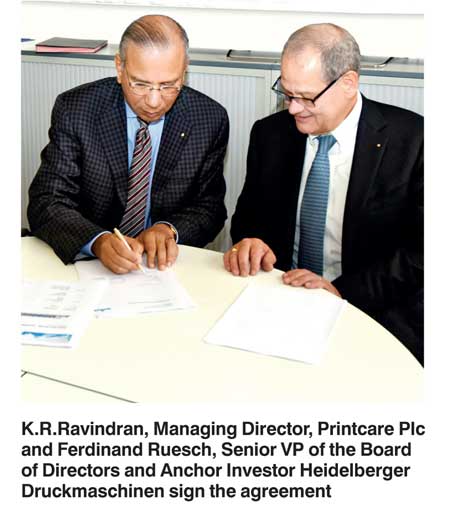Sunday Feb 22, 2026
Sunday Feb 22, 2026
Thursday, 21 September 2017 00:00 - - {{hitsCtrl.values.hits}}

By Darshana Abayasingha
The Chairman of Sri Lanka’s premier printing and packing company, Printcare, opines that the local industry must make better use of its competitive advantages to take on global markets, whilst the Government must work harder to improve business infrastructure. K.R. Ravindran adds that the Sri Lankan print industry must step up and compete not merely on price, but upgrade their own skills and competencies to give customers a product for which they will be willing to pay more.
Ravindran was speaking to the Daily FT when commissioning the Gallus RCS 430 printer at Printcare. The flagship of the Gallus Group, Sri Lanka and Printcare are proud to unveil the first-ever RCS 430 machine in the South Asian region, which can be configured and extended at will, plus, replace individual printing methods without separating the web. With a high degree of automation, the machine drastically reduces wastage and changeover times, and guarantees consistent quality across the line.
Ferdinand Ruesch, Vice President of the Board for Gallus Ferd, told the Daily FT, that with this new machine Printcare can offer unparalleled sophisticated print solutions to customers in Sri Lanka and all over the world, regardless of the material; be it standard labels, aluminium foil or embossing – the universality of the machine to print from flex, screen to foil in one insertion further elevates the company’s position on the international stage.
“We have never cut corners with investments on equipment,” avers Ravindran, who reveals that his company had spent over $ 5 million on this new machine. “It’s not a typical printing plant that we run here; when our customers walk into our factory part of our job is to sell them confidence.” It’s a sizeable investment for the industry, which will elevate its status and set the benchmark for future operations. “When we create new possibilities and opportunity like we have in this instance, the market will come to you,” he adds.
So, what does Printcare’s new machine offer to the market? Sri Lanka presents three types of packaging solutions: Primary packaging which goes directly on products – labelling, secondary packaging which involves boxing, and tertiary packaging which includes shopping bags and corrugated cartons, etc. Ravindran reveals that Sri Lanka has made great advancements in the areas of secondary and tertiary packaging with Printcare shipping to customers all over the world including Harrods of UK, which is a strong market for the company. Primary packaging poses a weakness as the industry has been very fundamental there, which is reflected in the labelling in FMCG, spirits, cosmetics and lifestyle sectors. With this new investment, Printcare and Sri Lanka can now offer labelling and primary packaging solutions that is on par with what is available in European and other developed markets, which will also be a boost for Sri Lankan exporters.
“When you stack products in markets, our cartons look very good. We have the same high-level and quality that you find anywhere else. For instance, tea which is an inexpensive product is available in that level of packaging. We have been a long way off with labelling, but now we can offer labelling that matches our secondary packaging. We will use expensive material, but with huge advancements in efficiency and little wastage – that will make the difference between giving a high price or a reasonable price. Price should not be beyond the customers reach. It is pointless having a fancy machine, unless you produce at a price which is acceptable and makes customers competitive. My job is to get your product off the shelf, thereafter your product must sell. Studies show that companies have milliseconds to catch a consumer’s attention in a supermarket; something catches their eyes and they check it. Our job is to get the product into their hands. That is what we are offering our customers,” Ravindran states.
The Gallus Group, part of Heidelberger Druckmaschinen AG, has sold the RCS 430 to some of the biggest printing and packaging houses in the world, and is now expanding in Australia and China. Ruesch says that every customer has soon expanded to a second machine following the efficiencies it delivers. Printcare is a world-class facility with great standards. He commended the processes adopted by the company with relation to raw material handling, finished goods, inspection and quality control. “With this new machine, it is playing in the global top league”. This machine guarantees quality from the very first label to the last, we assure 99% accuracy, he adds. Anyone could by the same machine, but it is also imperative how you choose to use it; printers need to be passionate about the business and their produce so that they could get the best out of the machinery.
It is imperative to expand horizons and constantly challenge boundaries in this business, avers Ravindran. Printcare is not focused only on Sri Lanka, but are heavy on serving global clientele he says, pointing out that his company is the 11th largest exporter in the country. We must not be restricted by a local outlook, and invest only to suit its requirements; but look at the broader bigger picture and lift the local market up. He points out that Sri Lanka offers lower warehousing costs, operational costs and labour, and that industries must take advantage of these benefits to compete with global brands.
However, in terms of competing with the rest of the world, Ravindran opines that there must be some changes. “The Government says everything must be free to market. The point is we are not operating in the same conditions. The duty system here offers challenges. They collect monies upfront from companies and they owe so many millions in rebates that need to come back to us – they are held up. There has to be better coordination between Inland Revenue and Customs. There are some products that have cesses, and there is talk that the Government wants to remove these cesses. This will allow people to come and dump things here, particularly from our neighbours – we need to be cautious of that. Electricity is also a big problem here, and we run with generators at times because we cannot rely on the power. We are using stabilisers with huge investments, because should a machine blow we are done for. So, if the government wants the industry to compete with everyone else – and we have done so – they must also make available the same facilities that others have.”
Printcare has positioned itself at the top end of the printing industry, with a strong focus on quality which is evident throughout every aspect of its production process and company operations. Quality is a key value addition in global competition against price and other elements, and printing will remain its core focus despite diversification into different forms of printing. Many Sri Lankan printers are competing and securing orders on price, but instead the focus must be on delivering premium value at reasonable margins.
Ravindran also called on the industry for better social responsibility practices, particularly with regards to disposal of refuse. Very few companies are responsible for waste management, and given the vast amount of inks that are produced it is imperative to dispose of them in a safe and suitable manner he avers, and these are areas the Government must develop tough new policy and drive implementation.
“Why are we not that good? We should be, we need to get to that point.” In comparison to India, we are streets ahead, but we lag far behind some of the others. Governments must develop policy to this end and strictly see through its implementation and improve transparency. Banning polythene is the right thing to do, he adds. There will be resistance, but it a good step considering the advancements made by Kenya.
“I am of the view that no one has a right to make exorbitant profits. The bigger you get the more humble you should become. What we have done is we have given dignity to the print industry here in Sri Lanka, and we will continue on our journey with these values at our hearts,” Ravindran concludes.
A former President of Rotary International, K.R. Ravindran, is the recipient of the ‘Sri Lanka Sighamani’ award from the President earlier this year, whilst a postage stamp of his profile was released in 2015; one of the few persons living with a stamp of himself. A winner of the Industry’s Lifetime Achievement Award in 2016, through his efforts with Rotary Club Ravindran was instrumental in forming the Sri Lanka Anti Narcotics Association, and spearheaded efforts to between the Government and UNICEF to make Sri Lanka Polio free, with Sri Lanka becoming the first South Asian country to become free of the disease.
He also championed an international funding program to reconstruct 23 schools that were damaged from the 2004 tsunami disaster, and was a Speaker at the Commonwealth Heads of State meeting in Malta.